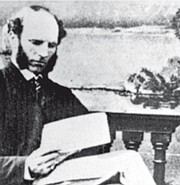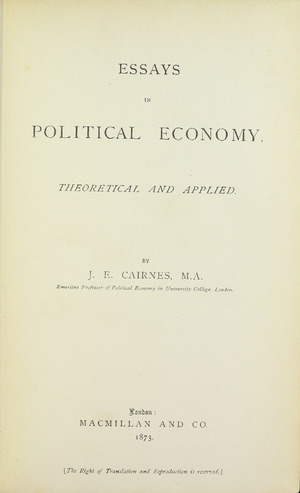John Elliott Cairnes facts for kids
Quick facts for kids
John Elliott Cairnes
|
|
|---|---|
 |
|
| Born | 26 December 1823 Castlebellingham, County Louth, Ireland
|
| Died | 8 July 1875 (aged 51) |
| Nationality | Irish |
| Spouse(s) | Elizabeth Charlotte Alexander (maiden) |
| Institutions | |
| Field | Political economy |
| School or tradition |
Classical economics |
| Alma mater | Trinity College Dublin |
John Elliott Cairnes (born December 26, 1823 – died July 8, 1875) was an Irish political economist. This means he was an expert in how countries manage their money, resources, and trade. He is often called the "last of the classical economists", a group of thinkers who believed in free markets and limited government involvement in the economy.
Biography
Early Life and Education
John Cairnes was born in Castlebellingham, County Louth, Ireland. His father, William Elliott Cairnes, was a very successful businessman who owned a brewery in Drogheda.
Even though his father was in business, John loved to study. He spent some years working in his father's office, but his real passion was learning. He went to Trinity College Dublin, where he earned his first degree in 1848. Later, he studied law and became a lawyer. However, he didn't really want to practice law. Instead, he spent his time writing about social and economic issues, especially those affecting Ireland. He became very interested in political economy.
Becoming a Professor
While living in Dublin, John Cairnes met Archbishop Whately, who was very impressed by his skills. In 1856, John was offered a special job: to become a professor of political economy at Dublin. This position was created by Archbishop Whately.
In 1857, John published his first book, Character and Logical Method of Political Economy. This book helped people understand economics as a science. It showed how important it was to be exact and clear when talking about economic facts. He always believed that economics should be studied like a science, looking at how things are connected.
Key Ideas and The Slave Power
John Cairnes also wrote about the "gold question." This was about what might happen to prices when a lot of gold was discovered in places like Australia and California. He wrote articles that carefully looked at the possible effects of this new gold supply.
In 1861, John became a professor at Queens College Galway. The next year, he published a very important book called The Slave Power. In this book, he explained why using slave labor was not good for the economy. He showed that it had many problems and was not efficient. His ideas in this book were very strong and helped shape how people in England thought about the American Civil War. He even predicted how the war might turn out, and he was mostly right!
Later Life and Health Challenges
After The Slave Power, John Cairnes wrote mostly about problems in Ireland, especially about university education. His health was never very strong, and in 1865, he had a bad fall from his horse. This made it hard for him to work actively, and he often got sick.
In 1866, he became a professor at University College London. He had to spend some time in Italy for his health, but he kept teaching until 1872. He even taught a class where women were allowed to attend, which was quite new for the time. Because of his health, he had to stop teaching in 1872 and became an honorary professor. He received a special degree from his university in 1873. John Cairnes passed away near London on July 8, 1875.
Family
On November 27, 1860, John Cairnes married Elizabeth ("Eliza") Charlotte Alexander in Galway. Eliza's father was a judge in India. John and Eliza had four children: one daughter and three sons. One of their sons, William Elliot Cairnes, became an officer and a writer. They named their second son, Robert Gould Cairnes, after Robert Gould Shaw, a hero from the Union Army during the American Civil War.
Work
In his later years, John Cairnes collected and published many of his writings. In 1873, he released The Political Essays, which included his writings on Ireland and its universities. He also published Essays in Political Economy, Theoretical and Applied in the same year. This book updated his ideas on the gold question and included his thoughts on topics like Political Economy and Land and Political Economy and Laissez-Faire.
In 1874, his biggest work, Some Leading Principles of Political Economy, newly Expounded, came out. This book continued the work of famous economists like Adam Smith and John Stuart Mill. It didn't cover every part of economics, but it focused on key ideas like value, the cost of making things, wages, labor, capital, and international trade. Cairnes often disagreed with Mill on some points, but he helped make their shared ideas stronger and clearer.
Understanding Economics as a Science
Cairnes always stressed that political economy is a science. This means it studies how things work in the economy without saying what should happen. It just shows the connections between different economic events. He believed that economics should not be mixed with social philosophy or try to use too many complex math formulas. He saw it as a "mixed science" that looks at both human behavior and physical facts.
He thought that economists should start with known causes, figure out their effects, and then check these effects against real-world facts.
Cost of Production and Value
Cairnes had interesting ideas about how the cost of making something relates to its value. Other economists, like Mill, thought that wages and profits were the main parts of the cost. But Cairnes argued that wages are what people earn, not a cost in the same way. He believed the real costs were the labor involved, the effort of saving money (abstinence), and the risk taken.
Competition and Value
Cairnes also explained that in a real society, it's not always easy for money or workers to move freely from one job to another. He said that society has different "non-competing industrial groups." For example, it's hard for someone working in one type of job to suddenly switch to a completely different one.
He pointed out that the cost of making something only sets its normal value when there is perfect competition within a group. But when goods are exchanged between different groups, their value depends on how much each group wants the other's goods. This idea helped people understand how value is determined in different situations.
The Wages Fund Doctrine
Cairnes also defended the idea of the "wages fund doctrine." This theory suggests that there's a certain amount of money available in an economy specifically for paying wages. Even though some other economists had stopped believing in this idea, Cairnes explained it in a clearer way. He showed how this "fund" could grow or shrink and how it affects wages.
His book Leading Principles also had great discussions on trade unions and protectionism (protecting local industries). He also clearly explained the complex ideas of international trade and value. His first work, Logical Method, explained and defended David Ricardo's theory of rent (how much landowners earn).
Overall, John Cairnes's work was a very important part of economic science from the English school of thought after J. S. Mill's famous Principles. He helped make economic ideas more precise and gave them a stronger foundation.
See also
 | Victor J. Glover |
 | Yvonne Cagle |
 | Jeanette Epps |
 | Bernard A. Harris Jr. |


